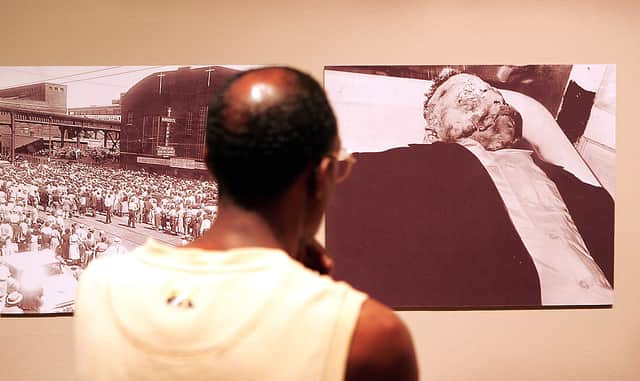Emmett Till: Carolyn Bryant dies age 88 - what happened to Emmett’s face, did he have an open casket funeral
and live on Freeview channel 276
Carolyn Bryant Donham, the white woman who accused Emmett Till, a Black 14 year old, of making improper advances before he was lynched in Mississippi in 1955, has died at the age of 88. She died on Tuesday night in hospice care in Westlake, Louisiana, according to a death report filed in Calcasieu Parish Coroner’s Office.
Emmett’s kidnapping and killing became a catalyst for the civil rights movement after his brutalised body was pulled from a river in Mississippi three days after his abduction and murder. His face and body had been badly mutilated, an eye was dislodged from its socket and he had been shot above his right ear. There was also evidence that he had been badly beaten around his back and hips. His naked body had been dumped in the water weighted down by a fan blade which had been secured to him with barbed wire around his neck.
Advertisement
Hide AdAdvertisement
Hide AdMamie Elizabeth Till-Mobley, Emmett’s mother and activist, decided to have an open casket funeral for her son, saying at the time: “There was just no way I could describe what was in that box. No way. And I just wanted the world to see.”
Emmett’s funeral was attended by tens of thousands of people, with photographs of his body circulating around the country after appearing in Jet magazine and The Chicago Defender.
What happened to Emmett Till?
In August 1955, Emmett had travelled from Chicago to visit relatives in Mississippi when Donham — then named Carolyn Bryant — accused him of making improper advances to her at a grocery store in the small community of Money.
The Rev Wheeler Parker, a cousin of Emmett who was there, said the 14-year-old whistled at the woman, an act that flew in the face of Mississippi’s racist social codes of the era.


Advertisement
Hide AdAdvertisement
Hide AdParker was the last living witness to Emmett’s abduction. They were staying at an uncle’s home in Mississippi when Emmett was taken in the dark of night.
Emmett had been pointed out to Donham’s then-husband Roy Bryant and his half-brother JW Milam, who killed the teenager. In 1955, an all-white jury acquitted the two white men in the killing, but, protected by double jeopardy, the men later confessed in an interview with Look magazine in 1956.
What has Emmett Till’s family said about Carolyn Bryant Donham’s death?
The Rev Wheeler Parker, Emmett’s cousin, said on Thursday (27 April) that his heart goes out to Donham, adding: “As a person of faith for more than 60 years, I recognise that any loss of life is tragic and don’t have any ill-will or animosity toward her.
“Even though no one now will be held to account for the death of my cousin and best friend, it is up to all of us to be accountable to the challenges we still face in overcoming racial injustice.”


Advertisement
Hide AdAdvertisement
Hide AdOllie Gordon, a cousin of Emmett who was seven at the time, said she had mixed emotions about Donham’s death.
“She was never tried in the court of man,” Gordon said. “But I think she was judged by God, and his wrath is more punitive than any judgement or penalty she could have gotten in a courtroom. I don’t think she had a pleasant or happy life.”
Comment Guidelines
National World encourages reader discussion on our stories. User feedback, insights and back-and-forth exchanges add a rich layer of context to reporting. Please review our Community Guidelines before commenting.
